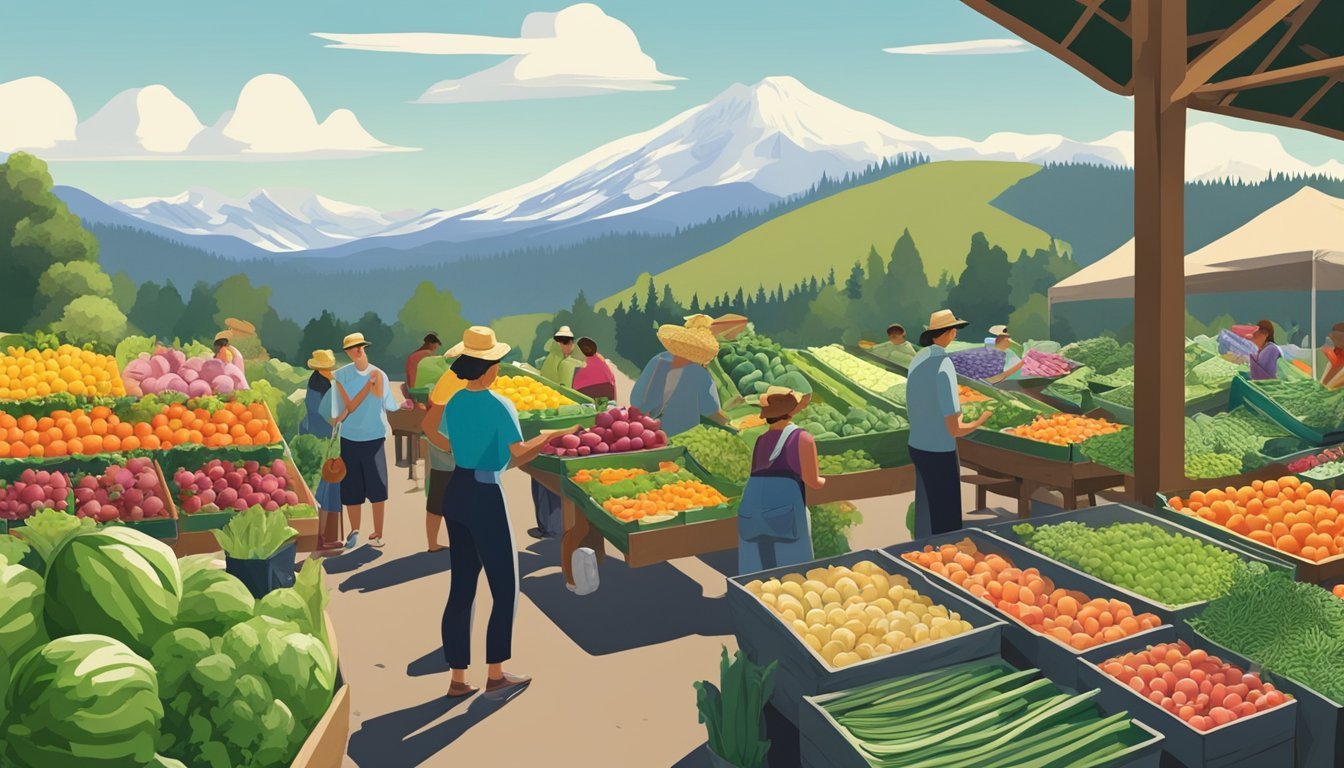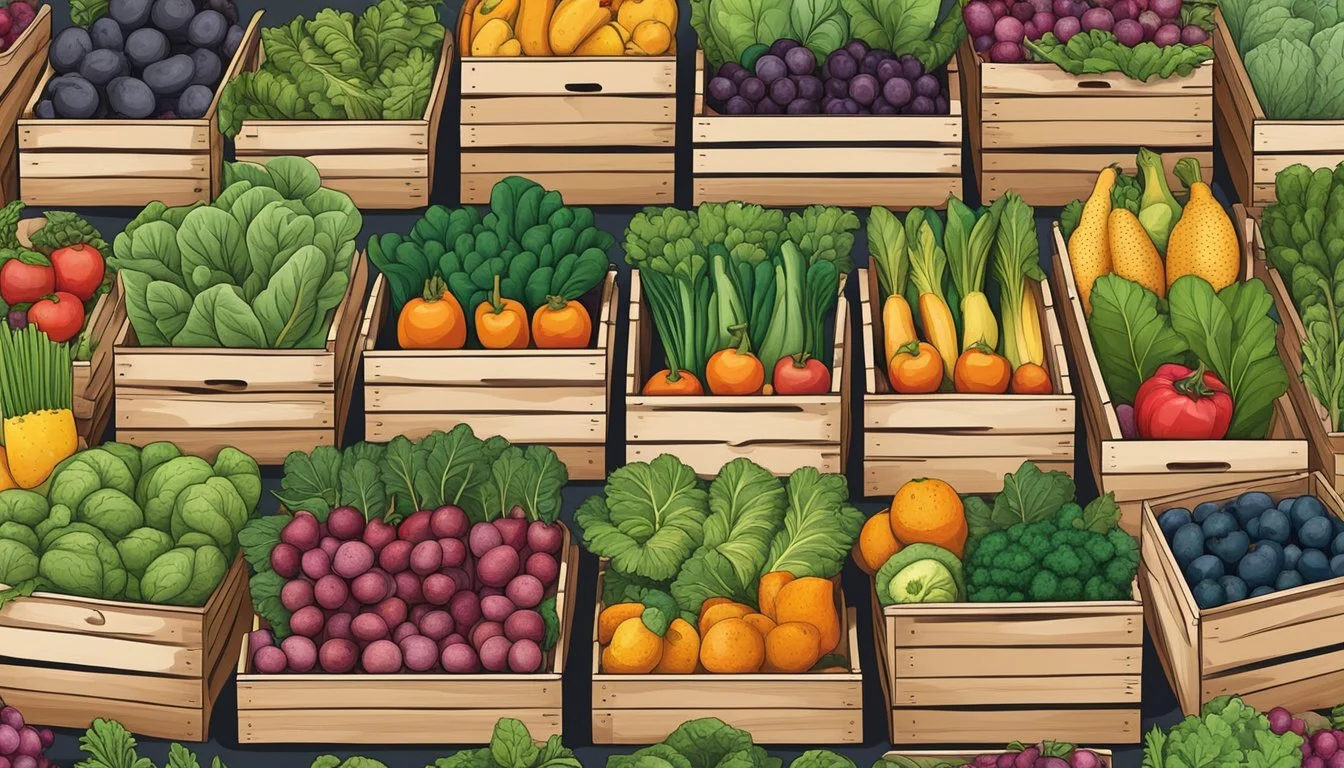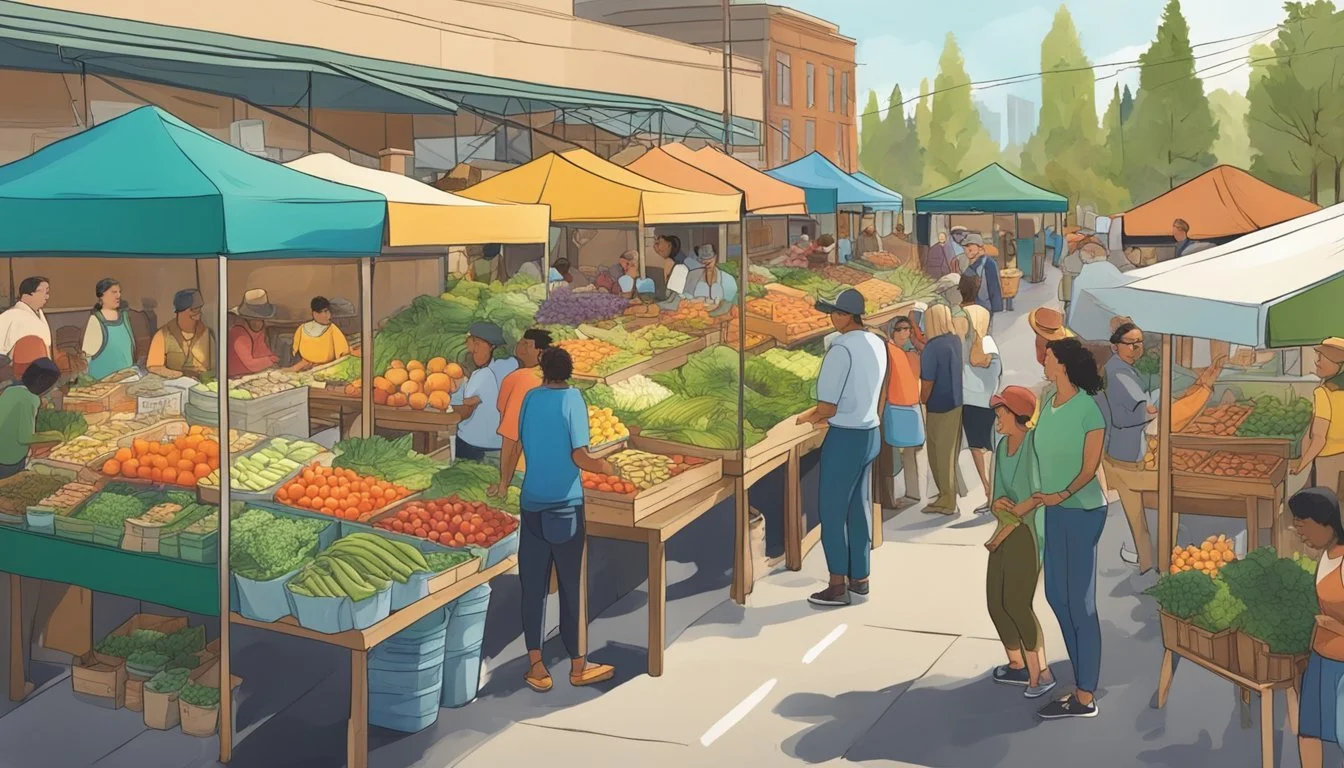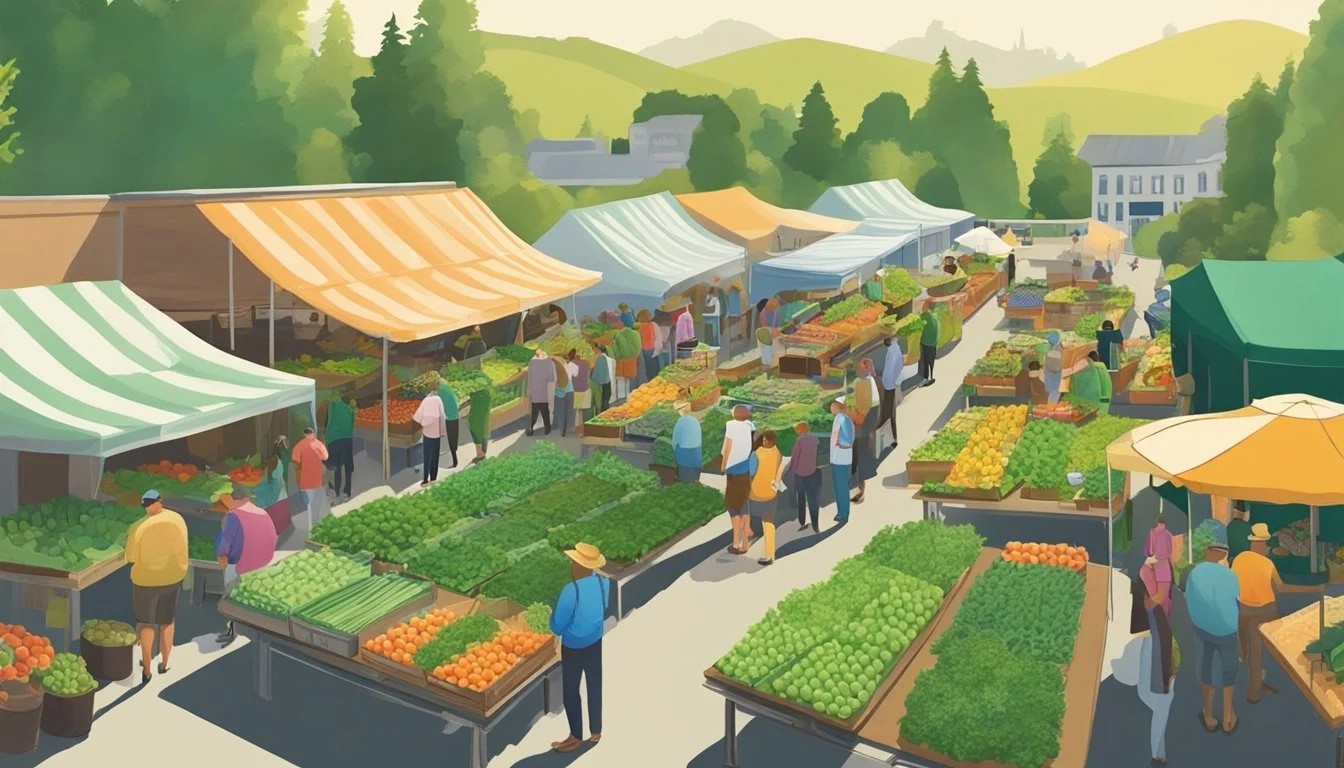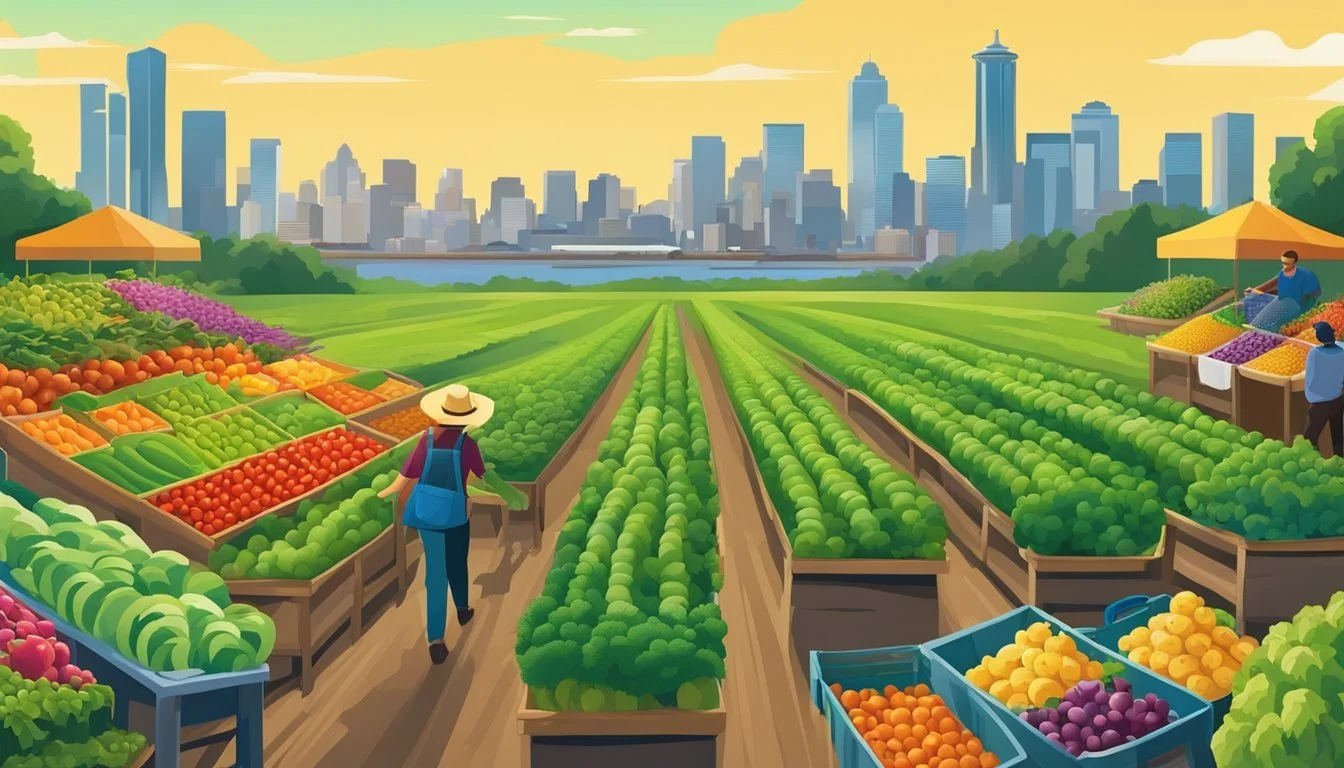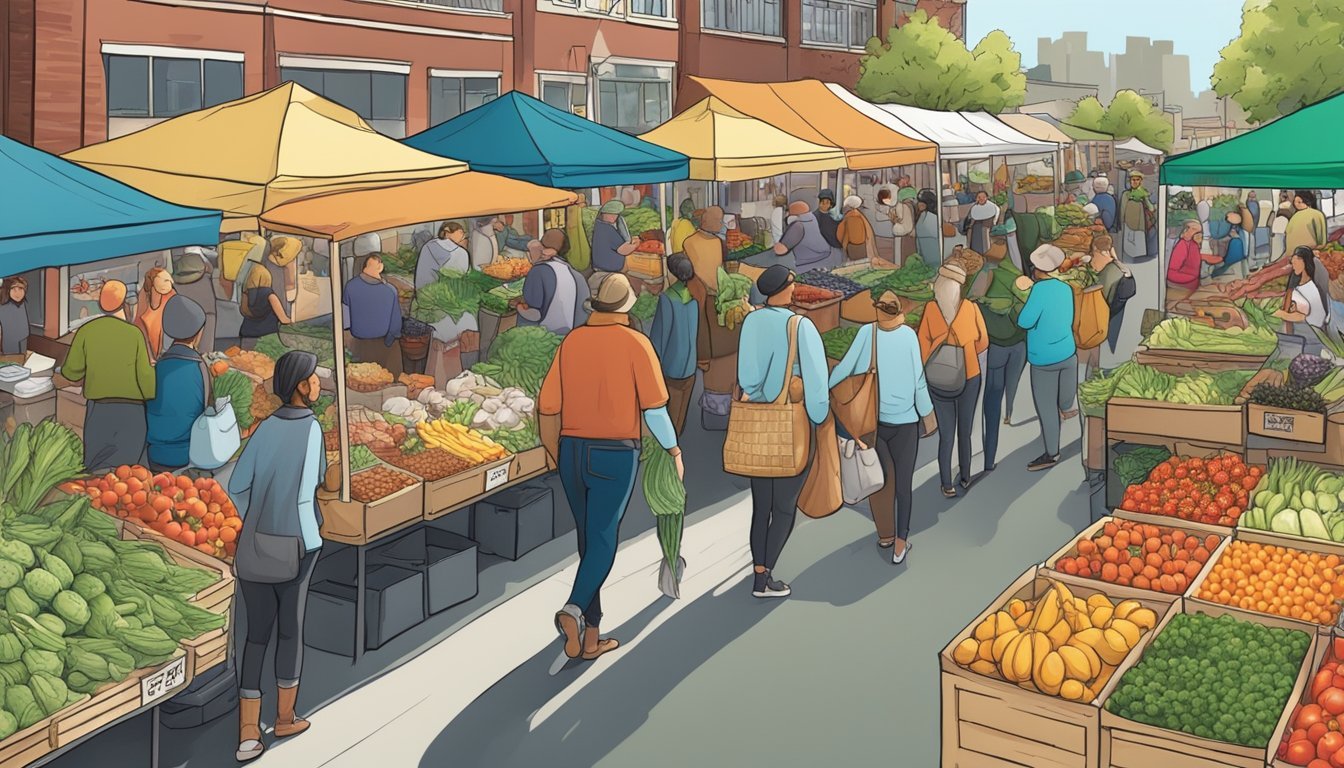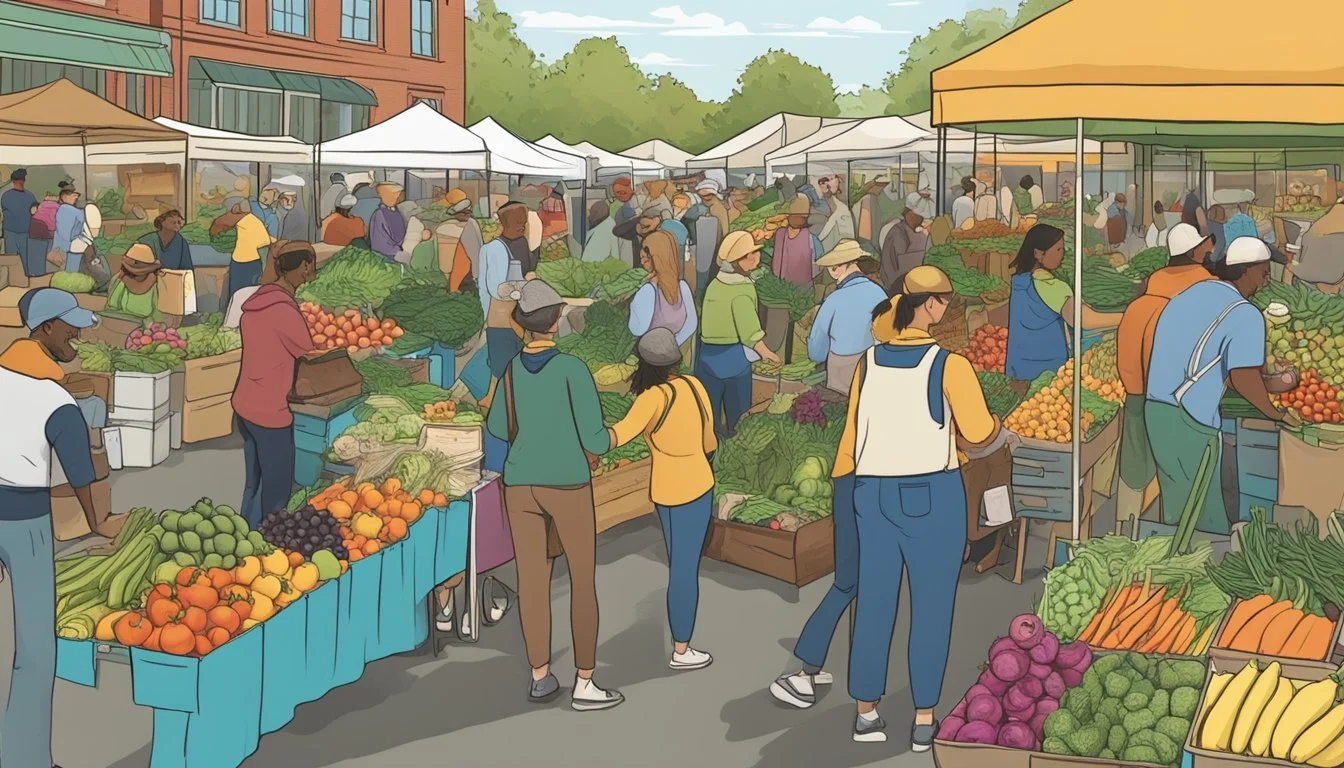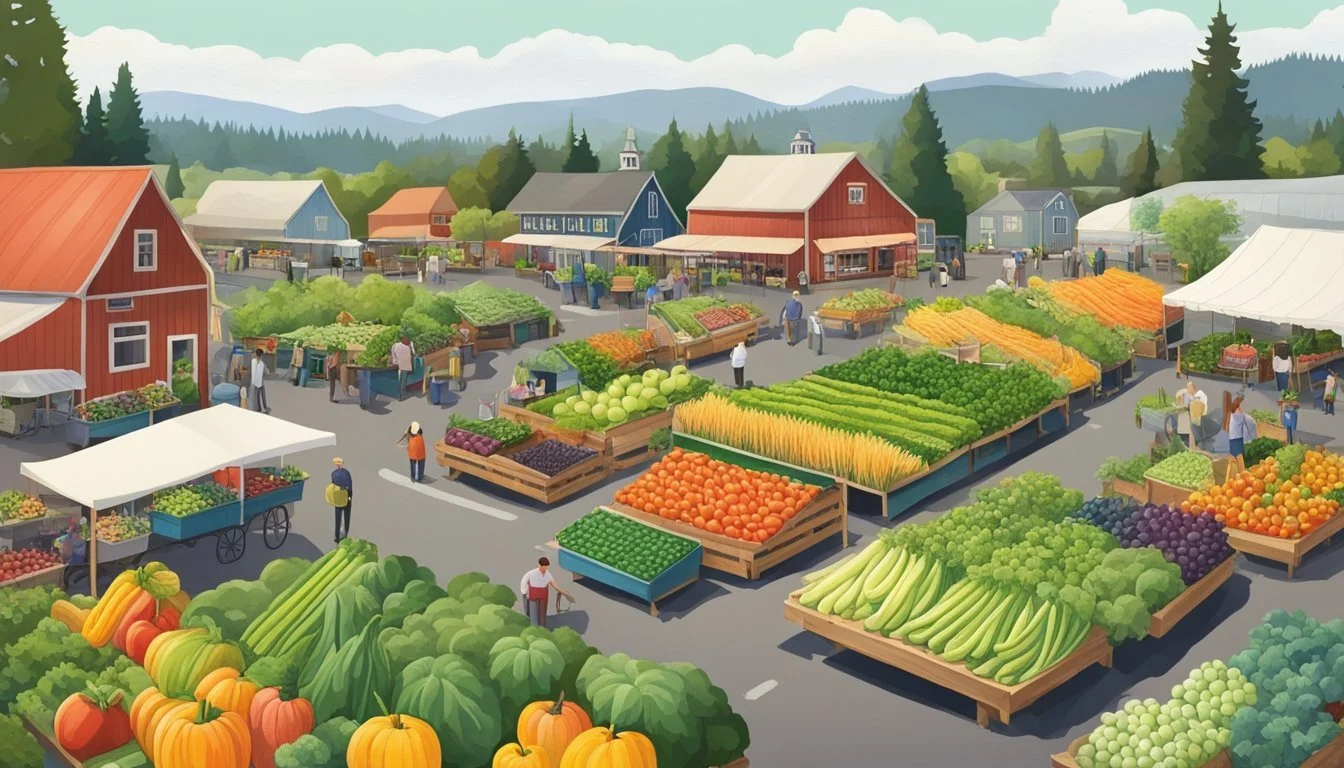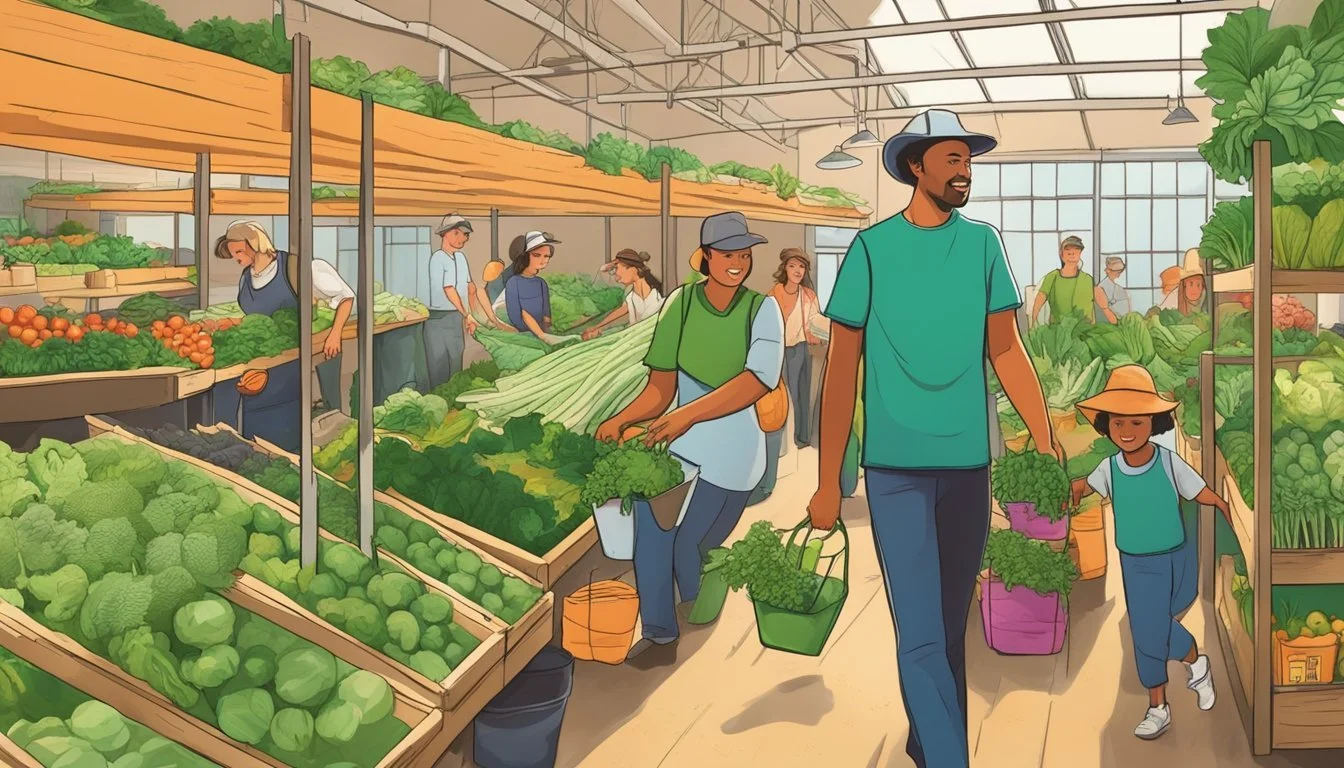Community Supported Agriculture (CSA) in Seattle, WA
Thriving Local Farm-to-Table Networks
Community Supported Agriculture, or CSA, represents a growing movement in Seattle, WA, that champions local food systems and bridges the gap between residents and the farmers who grow their food. By subscribing to a CSA program, members receive regular shares of fresh, locally grown produce directly from area farms. This model provides consumers with a clear traceability of their food, while farmers benefit from a stable revenue stream. It fosters a relationship built on mutual support where the risks and rewards of farming are shared between the producers and the community.
In Seattle, a city known for its commitment to sustainability and support of local businesses, CSA programs thrive. Many farms in and around the Seattle area offer a range of CSA options, providing seasonal vegetables, fruits, and even flowers. These subscriptions are not only a pathway to receiving the freshest possible produce but also an educational opportunity for consumers to understand the seasonality and challenges of local farming.
Farmers in the Seattle region are embracing the CSA model to build resilience in their operations. As unpredictable weather and fluctuating markets present ongoing challenges, CSA subscribers provide a dependable customer base. This relationship allows for more sustainable farming practices and encourages farms to focus on diversity and quality. CSA programs in Seattle illustrate a successful model for sustainable agriculture, ensuring that supporting local farms and consuming wholesome food is a viable, enduring practice.
Understanding CSA
Community Supported Agriculture (CSA) has revolutionized the way consumers in Seattle engage with local food systems. This model fosters a relationship between consumers and farmers, built upon a subscription-based framework that benefits both parties.
Concept and History
CSA began as a response to the growing distance between food production and consumption. In this model, consumers pay for a season's worth of farm produce in advance, which provides the farmer with stable income to manage their operations. The sense of community is inherent in CSA's history, with roots that can be traced to the mutual reliance between growers and local communities. Originally emerging in the 1960s in Japan and Europe, the idea found fertile ground in the United States in the 1980s and has since grown into a network of partnerships between farms and their surrounding urban fringes, particularly thriving in areas like Seattle.
Benefits of Joining a CSA
Consumers who join a CSA enjoy multiple advantages:
Local food: Fresh and organic produce is handpicked from the farm.
Healing connection: Fosters a relationship with the land and those who tend it.
Financial planning: Farmers can plan their financial needs with the upfront subscription revenue.
Risk sharing: Reflects a true partnership as subscribers share some of the risks of farming.
By subscribing to a CSA, members receive weekly or bi-weekly shares of produce, which often include a variety of vegetables, and may sometimes feature fruits, meat, and eggs, depending on the farm's offerings.
How CSA Supports Local Farmers
CSAs are crucial in supporting local farmers in several ways:
Stable income: Early-season capital helps with the farm's cash flow.
Reduced waste: Planned production leads to less surplus and waste, as harvests are pre-sold.
Marketing efficiency: Farmers can spend less time and resources on marketing.
Stronger community ties: CSAs foster a bond between farmers and their community, often involving members in farm events or volunteer opportunities.
In locations like Seattle, where urban and agricultural communities coexist, CSAs have become integral in creating sustainable food systems that are economically viable for farmers and beneficial for consumers who value fresh, organic produce.
CSA Programs in Seattle
Community Supported Agriculture (CSA) programs in Seattle connect consumers directly with local farms, offering subscriptions for regular deliveries of fresh, quality produce. These programs support local farmers and provide Seattleites with seasonal, organic, and sustainably grown food.
Types of CSA Subscriptions
Seattle's CSA landscape includes a range of subscription options to meet various consumer needs. Subscribers can choose from traditional season-long plans, typically lasting from June to October, or more flexible pro-rated options that allow for shorter commitment periods.
Full-season subscriptions: Commit to a farm's entire growing season and receive weekly or bi-weekly boxes of fresh produce.
Pro-rated subscriptions: Join mid-season or for a smaller number of weeks.
Seasonal Produce Offerings
CSA programs in Seattle are known for their diverse and rich assortment of seasonal produce. Subscribers enjoy a bounty that typically includes:
Vegetables: A variety from leafy greens to root vegetables.
Fruits: Seasonal fruits such as apples and berries when available.
Herbs and Flowers: Fresh herbs to enhance culinary dishes and occasionally flowers.
Farmers handpick these items ensuring peak freshness and flavor.
Organic and Sustainable Practices
Farmers involved in Seattle's CSAs often prioritize organic and sustainable practices when growing their produce. Local CSAs like The Local Choice Food Box offer boxes filled exclusively with organic items. Such commitments by area farmers reinforce the quality of the produce while ensuring long-term health of the land.
Organic: Farms avoid synthetic fertilizers and pesticides.
100% local: Encouraging reduced carbon footprint and ensuring produce doesn't travel far from farm to table.
Seattle's community-supported agriculture programs present an accessible means for individuals to engage with their food system, fostering a sustainable and organic lifestyle while supporting local agriculture.
Participating in CSA
Community Supported Agriculture (CSA) in Seattle allows consumers to purchase seasonal produce directly from local farms. By buying shares, members receive regular deliveries or pick-ups of fresh food and support sustainable agriculture practices.
How to Join
Individuals interested in joining a CSA program can search for local farms offering CSA subscriptions and choose one that matches their produce preferences and delivery needs. Typically, joining involves selecting between a full share or half share, which determines the amount of produce they will receive. Most programs have online sign-up where one can register and select their share type.
Commitment and Payments
Members commit to a CSA for a season, which can range from the summer months through fall. This commitment involves upfront payments that cover the duration of the CSA program. Some CSAs provide payment plans or accept SNAP/EBT to make fresh, organic produce more accessible. By participating, members share the risks of farming with the grower, ensuring support throughout the season.
Pick-Up and Delivery Options
CSA members often have multiple options for receiving their produce:
Pick-Up: Members can collect their shares at designated local drop-off points on specified days of the week.
Home Deliveries: Some farms offer home delivery services, which may require additional fees.
It is important for members to adhere to pick-up schedules or delivery arrangements as specified by their CSA provider. Certain farms may allow late pick-ups or make up deliveries for missed weeks, ensuring members still receive their full share of produce.
Supporting Local Economy
Community Supported Agriculture (CSA) programs play a crucial role in bolstering the local economy of Seattle, directly benefiting local farmers and engaging the community in the agricultural process. Through proactive participation and education, these programs establish a reliable income for small farms while fostering economic resilience.
Economic Impact on Local Farmers
CSA programs offer a significant financial advantage to local farmers in Seattle by providing them with a stable income source. Farmers receive upfront capital at the beginning of growing seasons from community members, which reduces the risk of fluctuating market conditions. This financial stability allows farmers to plan their crop production more effectively and invest in the necessary resources, ensuring a sustainable operation of their farm.
Revenue Streams for Small Farms
Small, family-owned farms in Seattle benefit from diverse revenue streams thanks to CSA subscriptions. Memberships generate consistent weekly income during harvest seasons, supplementing traditional sales avenues such as farmers' markets and local grocery partnerships. This mixed-revenue model is particularly vital for smaller operations, like market gardens, that might otherwise struggle to compete with larger agricultural businesses.
Notable sources of farm income include:
CSA membership fees
Sales at local farmers' markets
Wholesale to restaurants and shops
On-farm events and stand sales
Community Involvement and Education
CSAs encourage significant community participation, which extends beyond the economic to an educational sphere. As community members invest in local farms, they become more attuned to the seasonal workings of agriculture and the real costs of food production. This relationship cultivates a greater appreciation for local produce and a better understanding of sustainable farming practices. Moreover, the engagement opportunities offered by many CSAs, such as farm visits and volunteer days, result in a more informed and health-conscious community, contributing to the larger economy's well-being through educated consumption choices.
Environmental Benefits
Community Supported Agriculture (CSA) in Seattle contributes significantly to environmental health through natural resource conservation, composting, and biodiversity.
Natural Resource Conservation
CSAs in Seattle adopt sustainable practices to conserve natural resources. They often utilize organic farming methods, which prioritize the use of natural resources such as water and soil in a manner that maintains their long-term viability. These farms tend to apply water conservation techniques, which both preserve this vital resource and lead to the production of nutrient-rich food without reliance on synthetic chemicals.
Composting and Waste Reduction
The emphasis on compost as a cornerstone of waste management is notable among Seattle's CSAs. Composting organic matter not only reduces waste sent to landfills but also creates a rich, natural fertilizer that benefits crop health and soil quality. This practice aligns with the ethos of conservation centers in the region, supporting their missions to lessen environmental impact.
Promoting Biodiversity
CSAs help to promote biodiversity by growing a variety of crops and raising different breeds of animals. Diversified farming is not only a defense against pests and diseases but also supports various wildlife species. Farms often follow sustainable practices that encourage habitats for beneficial insects and wildlife, reinforcing the natural ecosystem.
Seasonal Considerations
Community Supported Agriculture (CSA) in Seattle is deeply influenced by the city's distinct seasonal patterns. These patterns determine the selection of crops and their harvest timelines.
Weather and Crop Selection
Seattle's temperate maritime climate shapes the variety of produce available through CSA programs. The summer months bring stable, warmer conditions, with June marking the start of the CSA season. During this period, farmers offer a range of seasonal produce including lettuces, berries, and peas. As the season transitions to October, cooler temperatures and increased rainfall allow for a second wave of crops such as root vegetables and hardy greens.
Summer Selection:
Berries (strawberries, blueberries)
Leafy Greens (lettuce, spinach)
Podded vegetables (peas, green beans)
Root Vegetables (carrots, beets)
Squashes (pumpkin, butternut)
Hearty Greens (kale, chard)
Harvest Timelines
The harvest timelines for CSA programs are directly linked to seasonal changes. CSA shares typically begin in June and continue for about 20 weeks, with a spectrum of fresh, organic produce being harvested at different stages. For instance, strawberries and radishes tend to be ready earlier in the season, while pumpkins and winter squash are harvested closer to the end, in October.
June - July: Early summer crops (berries, leafy greens)
August - September: Mid-season produce (tomatoes, zucchini)
October: Late-season harvest (pumpkins, squashes)
This schedule is subject to the variability of weather patterns, which may affect the exact timing of plantings and harvests.
Produce Quality and Variety
Seattle's Community Supported Agriculture (CSA) programs boast a reputation for offering fresh, high-quality produce directly from local farms. The diverse climate of the Pacific Northwest allows for a rich array of flavors and varieties, including succulent fruits, robust vegetables, and unique heirlooms that are celebrated for their taste and nutritional value.
Taste and Flavor Profiles
Seattle CSAs provide a remarkable range of flavor profiles, tailored to enthusiastic palates that appreciate variety. Cherries and berries, staple fruits of the region, are known for their vibrant, juicy flavors. Vegetables like kale, broccoli, and peppers contribute earthy undertones and spicy notes that can either complement dishes or star as centerpieces.
Fruits: Sweet and tart cherries, rich berries
Vegetables: Earthy kale, robust broccoli, spicy peppers
In salad mixes, salad greens and chicories introduce a combination of textures and flavors ranging from buttery soft to pleasantly bitter, creating complex and delicious salads.
Salad greens: A variety of textures and flavors
Chicories: Pleasantly bitter, adding complexity to salads
Heirloom and Unique Varieties
Seattle's CSAs are treasured for providing an assortment of heirloom tomatoes, beans, and greens not commonly found in conventional markets. These heirloom varieties often surpass standard offerings in both taste and nutritional content, and they reacquaint consumers with a world of flavors that have often been lost in mass production.
Heirloom tomatoes: Superior taste, varied colors, and shapes
Beans: A broad selection of traditional legumes
The CSAs deliver not just food, but a sensorial journey through quality produce that ranges from familiar staples to exclusive cultivars. Each week can bring about the discovery of the widest variety of flavors, from the delicate sweetness of fresh snap beans to the robust zest of a just-picked heirloom tomato.
Specialty CSA Offerings
In Seattle's diverse CSA landscape, subscribers can access a range of specialized products that extend beyond the typical offerings of fresh vegetables and fruiting crops. These specialty shares cater to a variety of dietary preferences and interests.
Meat and Dairy
CSAs in Seattle offer portions including grassfed beef, grassfed lamb, and pasture-raised Berkshire pork. The healthiest meat options often come from animals that are raised on open pastures with quality feed. Dairy selections might include farm-fresh eggs from chickens that roam freely, enhancing the richness of the yolk.
Meat Options:
Grassfed Beef
Grassfed Lamb
Pasture-raised Berkshire Pork
Dairy Options:
Eggs (from pasture-raised chickens)
Unique and Exotic Items
For those with an adventurous palate, some CSA shares in the Seattle area include unique and exotic items. These can range from locally sourced honey to rare berries and heirloom varieties of squash. Exploring these options allows members to experience a broader spectrum of flavors and supports the farmers who cultivate them.
Exotic Produce:
Seasonal Berries (e.g., huckleberries, elderberries)
Heirloom Squash Varieties
Other Unique Offerings:
Local Honey
Preservation Shares
Preservation shares are designed for those who value having seasonal produce year-round. These CSAs provide bulk quantities of items suitable for canning, pickling, and fermenting. Members can savor the taste of summer with preserved fruits and make use of root cellars for winter squash storage.
Common Preservation Items:
Bulk Fruits (for jams, jellies, and preserves)
Canning Vegetables (tomatoes, cucumbers, peppers)
Winter Squash (for cool, dark storage)
Seattle’s Community Supported Agriculture programs are not only a source of fresh, local produce but also a gateway to discovering specialized foods that cater to diverse culinary desires and promote sustainable eating habits.
Consumer Risks and Rewards
Involvement in Community Supported Agriculture (CSA) programs in Seattle illustrates a reciprocal relationship where both farmers and consumers navigate shared risks and reap long-term benefits. This partnership not only sustains local agriculture but also equips residents with fresher, largely organic produce.
Understanding Shared Risks
When consumers invest in a CSA program, they are effectively buying a share of the season's harvest from local farms. They take on a degree of risk inherent in farming, such as crop failures due to weather. This risk is a shared commitment — customers are not simply purchasing food, but are also investing in the farm's operations and future. Despite the risks, this symbiotic relationship reinforces a sense of community and connects consumers directly to their food source.
Long-Term Benefits of CSA Participation
The rewards of participating in a CSA extend beyond the immediate acquisition of fresh vegetables and fruits. Consumers are inherently supporting sustainability and environmentally friendly farming practices, fostering local economies, and enhancing their personal connection with food. Long-term benefits include:
Consistent access to a variety of fresh, local produce
Exposure to new types of produce and ways of cooking
Strengthened local farmer-consumer relationships
Additionally, in supporting CSAs, consumers contribute to the availability of fresh food within the Seattle area, an investment that returns to them in both tangible and intangible ways.
CSA Locations Around Seattle
In Seattle and the surrounding areas, community-supported agriculture thrives with a variety of farms and gardens offering CSA boxes. These options enable Seattle residents to enjoy fresh, local, and often organic produce throughout the seasons.
Farms and Gardens
The Local Choice Food Box operates out of Redmond, WA, and emphasizes 100% local and organic produce.
Dancing Goats and Singing Chickens Organic Farm, located in Yelm, WA offers CSA contents that include vegetables, fruit, meat, and eggs.
Farms in Woodinville and Duvall have dedicated land to grow fresh, organic food, with CSA pick-up options in multiple neighborhoods including North Capitol Hill in Seattle.
Mariposa Farm offers a main season CSA with 20 deliveries, starting from June and ending in October, available at farmer's markets across Seattle, Everson, and Bellingham.
Neighborhood-Specific Options
Residents of Seattle's Central District have direct access to fresh, organic produce from a 23-acre farm in Duvall as part of a community betterment initiative started by Reverend Dr. Robert Jeffrey Sr. in 2007.
In Tacoma and Puyallup, there are CSA pickups available which provide a selection of local produce including vegetables, fruits, and herbs.
For Seattle locals, especially those who live in neighborhoods like North Capitol Hill, there are tailored CSA options that provide convenient access to farm-fresh produce from within the Pacific Northwest region.
Spotlight on CSA Farms
Seattle's CSA scene is ripe with diversity, offering everything from organic vegetables to grass-fed meats. Farm subscribers are guaranteed fresh, high-quality produce while supporting local agriculture and sustainable practices. Below is a detailed look into some of the CSA farms serving the Seattle area.
Helsing Junction Farms
Located in Rochester, WA, Helsing Junction Farms is known for its wide array of organic vegetables. It employs small-scale vegetable production methods to provide nutrient-rich food to its CSA members.
SnoValley Gardens
SnoValley Gardens delivers fresh, sustainably grown food to the Seattle area. Their selection often includes high-quality vegetables that underscore their commitment to environmentally friendly farming practices.
Lowlands Farm
Specializing in pasture-raised Berkshire Pork, Lowlands Farm takes pride in offering some of the healthiest meat options around. They focus on sustainably raised animals, ensuring exceptionally clean and flavorsome pork.
One Leaf Farm
One Leaf Farm stands out for its small farm charm and commitment to sustainable agriculture. They offer a variety of seasonal produce that is both fresh and organically grown, adding to the rich tapestry of CSA options available.
Dancing Sprouts Farm
Striving for agricultural harmony, Dancing Sprouts Farm provides the Seattle community with sustainably grown food. Their CSA shares are an embodiment of their eco-friendly ethos.
Oxbow Farm and Conservation Center
Oxbow Farm and Conservation Center not only supplies the region with organic produce but also doubles as a conservation facility. They educate the public on sustainable farming while also providing nutrient-rich food.
Ramstead Ranch
At Ramstead Ranch, one can find grass-fed beef and grass-fed lamb. They emphasize the importance of pasture-based farming, offering meats that are both wholesome and ethically raised.
Word of Mouth Farm
This boutique operation, known as Word of Mouth Farm, takes pride in its intimate approach to CSA. Subscribers enjoy a variety of organic vegetables and the personal touch that comes from a smaller scale farm.
Each farm brings something unique to the table, from Sammamish Farms' expertise in organic produce to the pasture-perfected meats of Ramstead Ranch. In supporting these farms, Seattleites contribute to a food system that's as healthy for the environment as it is for their bodies.
Connecting with Communities
Community Supported Agriculture (CSA) in Seattle fosters a vibrant relationship between local farms and the surrounding communities. It emphasizes direct partnerships and a shared commitment to food security and sustainable practices.
Outreach and Partnerships
CSA programs in Seattle actively engage in outreach to build partnerships with various stakeholders in the community. Seattle Market Gardens, for example, offers a CSA program that serves as a linkage between urban growers and consumers, reinforcing the sense of community. Communication channels, such as community meetings, local events, and social media, are utilized to keep members informed and involved. These partnerships often result in shared resources, knowledge exchange, and strengthened community ties.
Partnership Benefits:
Enhancing local food systems
Building consumer-farmer relationships
Encouraging sustainable agriculture
CSA and Food Banks
A significant aspect of CSAs is their collaboration with food banks in Seattle. By committing to purchase shares, CSA members provide farmers with a stable source of income, enabling them to plan for efficient crop production and to contribute surplus produce to food banks. This symbiotic relationship supports food banks such as the Seattle Food Bank in their mission to address food insecurity. Additionally, some CSAs offer a 'donation share' option where members can directly sponsor a share of fresh produce for delivery to a local food bank.
Food Bank Collaborations:
Surplus sharing to prevent food waste
'Donation share' programs for direct support
Ensuring fresh produce for food-insecure communities
Future of CSA in Seattle
Community-supported agriculture (CSA) is poised for a significant evolution in Seattle. This growth is expected to come from a blend of increased consumer interest and a collective move towards sustainable living.
Trends and Growth
The trajectory of CSA growth in Seattle indicates an increasing consumer preference for locally-sourced, organic food. Demographic shifts towards a more health-conscious populace, coupled with the region’s support for environment-friendly practices, have positioned CSAs as a viable alternative to traditional food sources. Initiatives by BIPOC-owned farms have been particularly instrumental in this growth trajectory as they work towards more inclusive and diversely supplied CSAs. Data suggests CSAs in the region will likely see heightened activity both in terms of subscriber numbers and farm participation.
Increased Demand: As Seattle's community becomes more invested in health and sustainability, the demand for CSA boxes has risen.
Diverse Supply Chains: BIPOC-owned farms are playing a key role in diversifying the offerings within CSA programs, reinforcing both cultural inclusivity and economic resilience.
Comprehensive Subscriptions: Many CSAs are expanding beyond just produce to include a range of local products, including meats, cheeses, and artisan goods.
Building a More Sustainable Seattle
The CSA model provides a robust framework for creating a more sustainable Seattle. By supporting local farmers directly, consumers help ensure that farmland is used responsibly and that agricultural practices contribute to environmental conservation. CSAs can also be seen as a means to combat food deserts and ensure that all Seattle residents have access to fresh, nutritious food.
Reducing Carbon Footprint: By shortening the food supply chain, CSAs contribute to lowering carbon emissions associated with transportation and packaging.
Supporting Local Economy: CSAs keep money within the local ecosystem, fostering economic growth and creating jobs that have a direct impact on community wellbeing.
By adhering to these trends and principles, the future of CSA in Seattle looks to be both dynamic and integral to the city's larger goals for health, inclusivity, and environmental sustainability.

